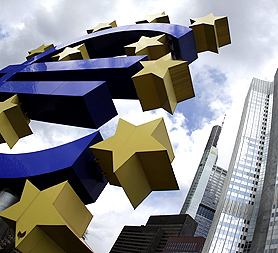Greek financial crisis sparks contagion fears
Updated on 28 April 2010
Fears that the Greek crisis could spread across Europe dominate financial markets as German Chancellor Angela Merkel calls for a quick decision on the bailout of the debt-stricken country.

Merkel said Germany could help bailout Greece within a matter of days – rather than leaving its European neighbour to wait weeks for its first bailout injection.
German lawmakers met with the International Monetary Fund chief Dominique Strauss-Kahn today, offering policymakers an aid package worth 100-120 billion euros over three years, against the 45 billion pledged to date by the IMF and euro zone.
Germany's finance minister Wolfgang Schaeuble said: "The goal of the German government is - if the meetings in Athens with the Greek government, the IMF, the ECB and the EU Commission succeed - to come to a decision as quickly as possible within the euro zone and the ECB."
However, German taxpayers have rallied against helping Athens, calling for Greece to leave the euro zone amid doubts that the 45bn euro bailout would save Greece from going bankrupt.
FactCheck with Cathy Newman
Should the UK heed the warning of the Greek crisis?
The euro zone countries have pledged 30bn euros between them and the IMF 10-15bn euros, but experts question if the funds will cover the 39bn euro debt Greece is expected to wrack up over the next 12 months, on top of costs outlined in the 2010 budget deficit.
Stock markets across the globe have tumbled as uncertainty surrounding the bailout continues, and after ratings agency Standard & Poor's downgraded Greek debt to 'junk' status yesterday.
Greek regulators have banned short-selling today, in an effort to stem the fallout in its stock market by prohibiting traders from betting on falling shares.
Deutsche Bank has said Greece is locked in a "death spiral", as the financial markets call on the IMF for decisive action.
Analysis from Dublin-based business analyst Dr Peter Stafford
There has been a growing disquiet in Dublin that when European leaders talk of countries with unacceptable deficits, it includes us.
Ireland has been praised by the European Commission for the speed at which it formulated the National Asset Management Agency (NAMA) to take over the worst debts from the banks into State control, and cut social welfare payments and public spending.
But, in terms of NAMA, at least, the impact is merely a statistical one. The NAMA debts are off balance sheet for statistical purposes and so go some way to putting distance between Ireland and Greece on the league table of European indebtedness.
Many Irish commentators are now saying that if Eurostat included all Irish debt, the IMF and others would be looking at Dublin and Athens with equal concern.
Greece is due to repay debts of around 8.5bn in mid-May, and will need to secure some bailout funding by then. Germany could almost clear this, with a proposed loan of 8.4bn euros.
A poll today shows the majority of Germans oppose the move, as German newspaper Bild determines that Greece is "all but broke now".
"Will the bankrupt Greeks pull all of Europe down," Germany’s biggest selling tabloid Bild asked.
In the face of rising criticism across Germany, Ms Merkel warned Athens it must be honest.
"You have to economise, you have to become fair, you have to be honest; if not, nobody can help you", she said.
As Greece continues to wait for funds from its euro zone partners, fears of contagion have spread to Portugal.
These fears threaten the stock markets of other indebted euro zone countries, posing a risk to the euro.
Portugal's benchmark stock index took the biggest hit yesterday since Lehman Brothers collapsed in 2008, sliding almost 6 per cent as Standard & Poor’s cut the country's credit rating making it less attractive for investors.
S&P raised further concerns by lowering its rating on Spain as the market closed in London today, foreseeing an "extended period" of subdued growth.
"The chances of a default by the Greek government are increasing not by the day but by the hour", said Koen De Leus, an economist at KBC Securities.
"If the IMF and European governments don’t come up with something quickly, then I see the market going down further quite rapidly."
The euro recouped losses today on hopes of a bigger, faster aid package for Greece, after trading at its lowest point in a year yesterday at $1.3145.
Analysts said the single currency will remain under pressure until the rescue plan is more clearly defined.
Erik Nielsen, chief European economist at Goldman Sachs, said the IMF and the euro zone countries were likely to be "haggling" over the burden sharing.
The markets however will be looking how the bailout package will be delivered to Greece, he said.
"Investors should focus on the conditionality attached because that’s what will determine the sustainability of the programme," he said.

